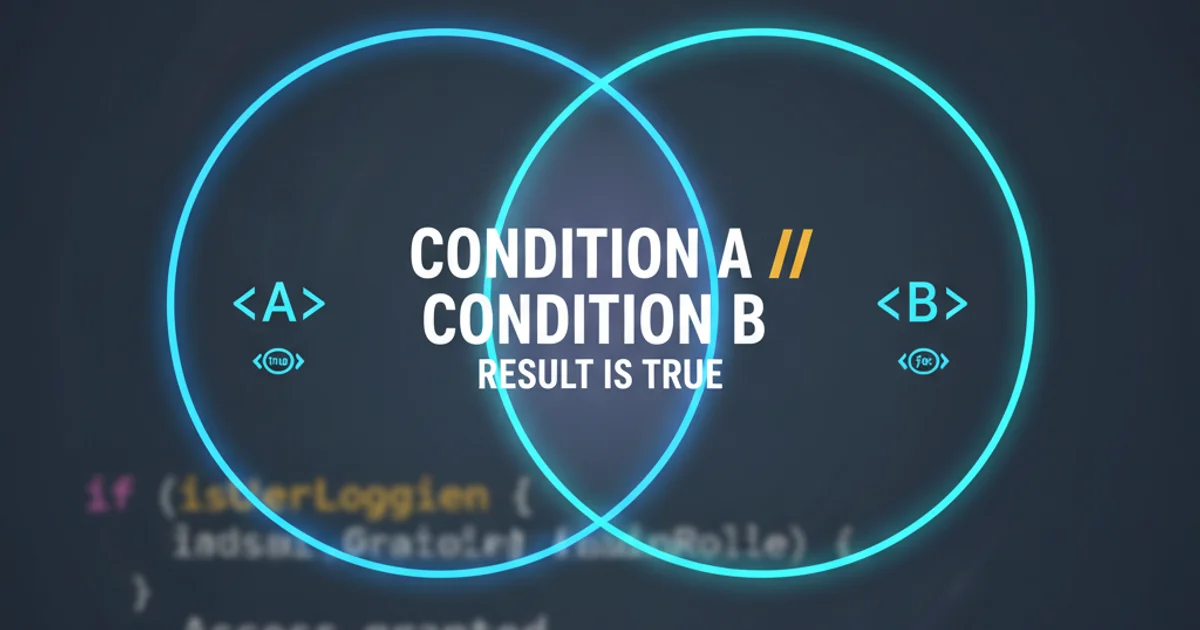How to use 'or' in Java?
Categories:
Mastering the 'or' Operator in Java: A Comprehensive Guide

Explore the various ways to implement logical OR operations in Java, from basic boolean expressions to advanced conditional logic and bitwise operations.
In Java programming, the 'or' concept is fundamental for controlling program flow and making decisions based on multiple conditions. Unlike some languages that might use a keyword like or, Java primarily uses symbols for its logical and bitwise OR operations. This article will delve into the different types of 'or' operations available in Java, their use cases, and best practices for their implementation.
Logical OR Operator (||)
The logical OR operator, denoted by ||, is used to combine two boolean expressions. It evaluates to true if at least one of the operands is true. A key characteristic of || is its short-circuiting behavior: if the first operand evaluates to true, the second operand is not evaluated because the overall result is already determined to be true. This can be beneficial for performance and preventing NullPointerExceptions.
public class LogicalOrExample {
public static void main(String[] args) {
boolean condition1 = true;
boolean condition2 = false;
boolean condition3 = true;
// Example 1: true || false -> true
if (condition1 || condition2) {
System.out.println("Condition 1 OR Condition 2 is true.");
}
// Example 2: false || true -> true
if (condition2 || condition3) {
System.out.println("Condition 2 OR Condition 3 is true.");
}
// Example 3: true || (expensiveOperation()) -> expensiveOperation() is not called
if (condition1 || callExpensiveOperation()) {
System.out.println("Short-circuiting in action.");
}
}
public static boolean callExpensiveOperation() {
System.out.println("Expensive operation called.");
return true;
}
}
Demonstration of the logical OR operator (||) and its short-circuiting behavior.
|| for boolean expressions where short-circuiting is desired, as it can improve performance and prevent unintended side effects from the second operand's evaluation.Bitwise OR Operator (|)
The bitwise OR operator, denoted by a single pipe |, performs a bit-by-bit OR operation on its operands. Unlike the logical OR, it does not short-circuit; both operands are always evaluated. When used with boolean operands, it behaves like a logical OR but without short-circuiting. Its primary use is with integer types to manipulate individual bits.
public class BitwiseOrExample {
public static void main(String[] args) {
int a = 5; // Binary: 0101
int b = 3; // Binary: 0011
// Bitwise OR: 0101 | 0011 = 0111 (Decimal 7)
int result = a | b;
System.out.println("Bitwise OR of " + a + " and " + b + " is: " + result); // Output: 7
boolean condition1 = true;
boolean condition2 = false;
// Bitwise OR with booleans (no short-circuiting)
if (condition1 | condition2) {
System.out.println("Condition 1 | Condition 2 is true (both evaluated).");
}
// Example of non-short-circuiting with a method call
if (condition1 | callAnotherOperation()) {
System.out.println("Non-short-circuiting in action.");
}
}
public static boolean callAnotherOperation() {
System.out.println("Another operation called.");
return false;
}
}
Usage of the bitwise OR operator (|) with integers and booleans.
| for boolean expressions unless you specifically require both sides to be evaluated, even if the first operand is true. In most logical scenarios, || is the correct choice.Choosing the Right 'OR' Operator
The choice between || and | depends entirely on your specific needs. For conditional logic involving boolean expressions, || is almost always preferred due to its short-circuiting behavior, which can prevent errors and optimize performance. The | operator is primarily used for bit manipulation, where you need to perform OR operations on the individual bits of integer values. Using | with booleans is rare and typically only done when side effects of the second operand are explicitly desired, regardless of the first operand's value.
flowchart TD
A[Start] --> B{Are you evaluating boolean expressions?}
B -->|Yes| C{Do you want short-circuiting?}
C -->|Yes| D["Use `||` (Logical OR)"]
C -->|No| E["Use `|` (Bitwise OR for booleans)"]
B -->|No| F{Are you manipulating bits of integer values?}
F -->|Yes| G["Use `|` (Bitwise OR for integers)"]
F -->|No| H[Consider other operators or logic]Decision flow for choosing between logical OR (||) and bitwise OR (|).
Understanding the distinction between || and | is crucial for writing efficient, correct, and robust Java code. Always consider the context and the desired behavior when implementing 'or' logic in your applications.